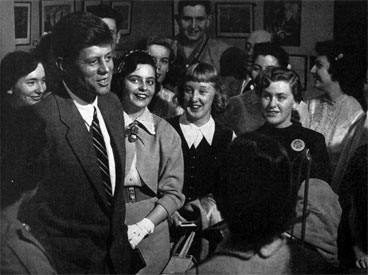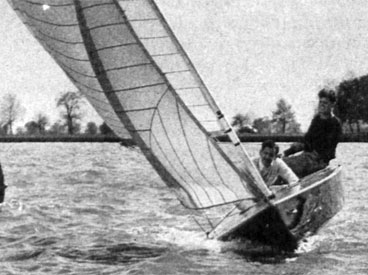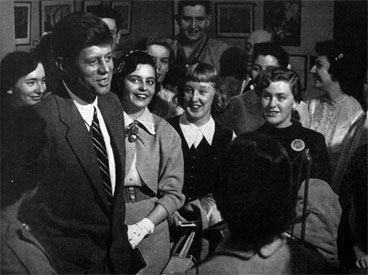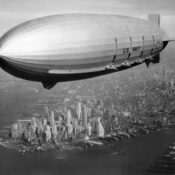This is the first installment of our series “Reconstructing Kennedy.” Click here to read part two, “Kennedy on the Campaign Trail.”

The first time the Post took notice of John F. Kennedy, he was still a very junior senator from Massachusetts. It was unusual for the magazine to run a feature article on a senator, particularly one as young and inexperienced as Kennedy. But Paul F. Healy, author of “The Senate’s Gay Young Bachelor,” found Kennedy particularly newsworthy.
For one thing, he was a fresh face in the senate, idealistic and energetic. The 36-year-old senator had “that look of youth,” Healy wrote. “He was six feet tall, with a lean, straight, hard physique and the innocently respectful face of an altar boy at High Mass.”
Throughout his career, his youthful looks prevented many colleagues and foreign leaders from taking him seriously. His appearance and demeanor could prove a handicap, as on the day he was boarding the subway car that ran between the Capital and the Senate Office Building. As he stepped into the car, the subway guard told him, “Stand back; let the senators go first!” The anecdote says much about Kennedy’s youthful looks, as does the fact that he complied and waited for the other senators to board ahead of him.
But his appearance proved a strong advantage among women voters. “During the campaign,” Healy wrote, “every woman who met Kennedy wanted either to mother him or marry him. At first glance, he looked a little lonesome, and in need of a haircut and perhaps a square meal… Many women have hopefully concluded that Kennedy needs looking after. In their opinion, he is, as a young millionaire senator, just about the most eligible bachelor in the United States—and the least justifiable one.”
On the date that line appeared in the Post, Kennedy had less than 100 days of bachelorhood left. He was already engaged to Jacqueline Bouvier, but the couple delayed the announcement of their wedding until the after the bachelor story ran.
Healy was also fascinated by Kennedy’s background: here was a young man who had grown up in comfort and privilege but who had requested combat duty in the second world war. Due to his nautical experience, Kennedy was given command of a torpedo boat in the South Pacific. On a moonless night in August, 1943, a Japanese destroyer ran over Kennedy’s PT boat, cutting it in two. Kennedy led the survivors on a swim to a distant island, helping one wounded man to safety by holding the strap of the man’s life vest in his teeth as he swam. Kennedy’s citation for “extremely heroic conduct,” says, “During the following six days, he succeeded in getting his crew ashore, and after swimming many hours attempting to secure food and aid, finally effected the rescue of his men.”
According to Healy, Kennedy’s war experiences had made him “more serious.” Though still young, he was “basically a mature and responsible fellow [who] possesses an inner fire which has enabled him to rise gallantly to the occasion whenever it was required.” He also had the sort of character that made people want to do something for him. This compelling appeal might be the earliest reference to what was later called the Kennedy “charisma.” The term was applied to the president so often that many people began to wonder if it had been made up just for Kennedy. By the time he was in the White House, Kennedy’s critics were heartily sick of hearing about charisma. They argued that it was no more than superficial charm, and that Kennedy’s political success could all be attributed to the judicious application of his father’s fortune.

Kennedy made fun of the accusation that his father had bought his victories. Speaking at a Washington dinner during his 1958 campaign, Kennedy pulled from his pocket a “telegram,” which he said was sent from his wealthy father, former ambassador to the United Kingdom Joseph Kennedy, who was sunning somewhere on the French Riviera. He told the attendees, “I have just received the following wire from my generous daddy. It says, ‘Dear Jack, don’t buy a single vote more than is necessary. I’ll be damned if I’m going to pay for a landslide.'”
Kennedy could afford to joke about his father’s influence because it was widely known how hard he worked for each political victory. Healy’s article is the first of many that would repeat the same story: Kennedy was a relentless campaigner. He rose early, traveled long, gave numerous speeches that rarely repeated each other, shook any hand he could, and retired at night with time enough to get four hours’ sleep.
It was an impressive performance for someone who, until seven years earlier, had intended to be a journalist. His father had groomed his oldest boy, Joe, Jr., for a political career and expected him to keep winning until he entered the White House. But after Joe died in World War II, Joe’s expectant look turned to John.
For a very brief period, John Kennedy worked for Hearst newspapers, and was looking forward to an intellectual’s life of researching and writing history. But then a vacancy opened up in the Massachusetts’ 11th district. Kennedy ran and won. He may not have loved politics, but he was always competitive and he loved winning.
This early decisive victory was the start of a trajectory that would take him from congressman to president in just 14 years.
To read more from the Post‘s series on John F. Kennedy, click here.
Become a Saturday Evening Post member and enjoy unlimited access. Subscribe now



